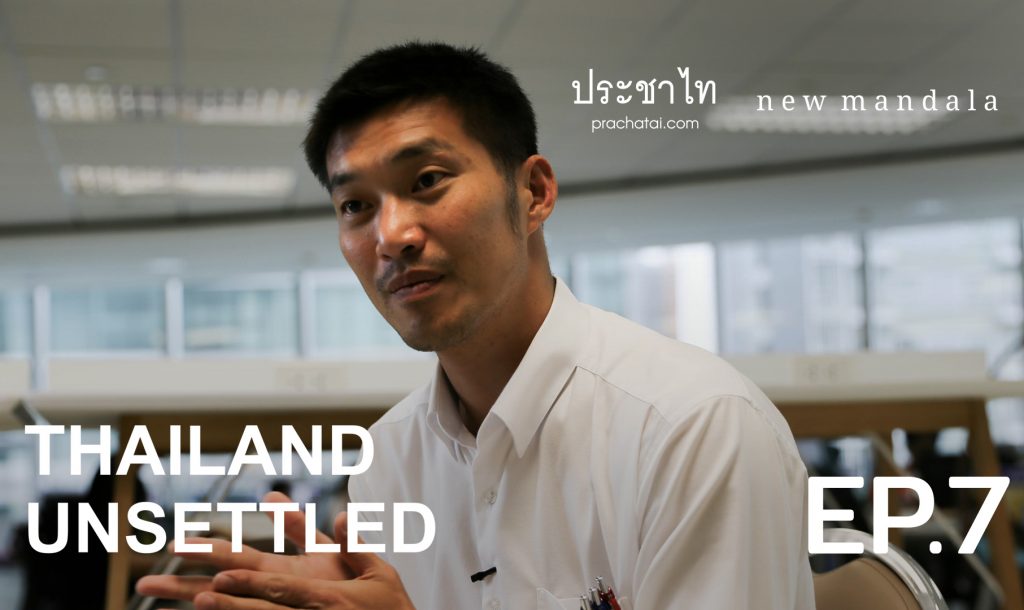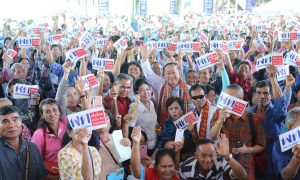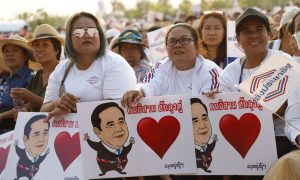The episode
Thailand’s 2019 election swept in the pro-democracy Future Forward Party into parliament, whose vocal anti-junta platform won it 80 seats after only a year in existence and a few months of campaigning. Here, party leader Thanathorn Juangroongruangkit offers a glimpse into the future of Future Forward, laying out his intentions to revolutionise local elections as a strategy to engage ordinary people in democratic change and answering the accusation that the party is riding too much on his individual charisma. And what of the perpetual threats of party dissolution and judicial harassment hanging over the party?
The guests
Tycoon-turned-politician Thanathorn Juangroongruangkit is the leader of Future Forward, a party now central to the pro-democracy wing of Thai politics due to its control over the third-largest number of seats of any party in the lower house. This month, Thanathorn publically put himself forward as a candidate for prime minister to lead the formation of a potential governing coalition, overturning his previous insistence that the next prime minister should come from Pheu Thai.
Yesterday, the Constitutional Court opened a case against Thanathorn that could see the party leader stripped of political office and banned from politics. While judges consider allegations against Thanathorn put forward by the controversial Election Commission, the Court has suspended his status as an MP ahead of the post-election parliament’s first session. Future Forward’s electoral success has been matched with backlash from military and traditional elites, with both Thanathorn and other party leaders currently the subject of numerous other criminal cases.
Transcript
Future Forward has received 80 seats in the lower house. It’s a resounding success for a party only a little over a year old. But is the party riding on the popularity of individual leaders, as some have argued? How do you, as party leader, intend to institutionalise the party?
Who could create a political party that is not reliant on individuals within the space of a year? Whoever thinks it’s possible has never gotten their hands dirty and tried, I think. It is unavoidable that a party has to be like this at first. What movements or organisations, immediately after being formed, enjoyed mass participation that led to political change? I can’t think of any. So I think this kind of thing is normal. Any organisation that has just been established has to lean on its founders. So Future Forward’s current challenge is to build an institutionalised political party. That’s one of our main tasks going forward. Previously, the dynamics of the election didn’t allow us to envision anything long-term, because the situation was changing every day. The message we had to communicate had to change, had to be rethought each week. Going forward, we will devote the time and resources to building a more resilient party.
Let me give an example from the party’s working plan for the remaining seven months of the year. We’ve decided that we must have at least two online votes where our members decide key issues. We want major resolutions in the party to increasingly come from collective decision-making. For example, we’re about to have a meeting of all our MPs—treating them like a defacto organisation of the party. Whether we’re considering submitting a question to parliament, a matter related to a commission, initiating a motion or even submitting a draft law, all of these things have to pass through a meeting of all our MPs. What else?
We’re building an organisation that will participate in local elections too, which we see as key to developing rigorous politics. If we can do these various things, the party will be less reliant on its leaders.
Something else we give great importance to is the raising of funds in a way that is not reliant on any single person or source. I must say that Future Forward is keen to bring new resolutions to politics, especially one concerning party fundraising. You know, our party is really serious about selling merchandise—our shop is just next door. If you have time, please come support us a little!
I think the issue of funds is very important. For example, during the election campaign, we weren’t able to raise enough funds. We were only on our feet and began raising funds on 3 October 2018 [when the Election Commission approved the party]. So from 3 October until the beginning of January when we began campaigning, we had only three months. We were able to raise tens of millions, which was a feat—but enough to run an election campaign? No, not enough. A party needs more funds than that. So I invested about more than 90 million baht into the party—about 100 million baht, give or take a little.
What do other parties do? Say somebody loans 100 million baht to a party. Once the party is in control of that 100 million baht, there is no need to declare it [as a loan]. There is no need to declare it, there are no details. But it’s not the same with Future Forward. When I invested 100 million baht into the party, it was in the form of a publicly announced loan. Everybody knows that Future Forward is 100 million baht in debt to Thanathorn. And I intend to receive every baht and satang back too. I didn’t give away that money for free. All this was written in Future Forward’s account book for all our members to see, for all our leaders to see that Future Forward is in debt to Thanathorn to the tune of 100 million baht and that this money has to be paid back. We’re trying to do everything to fundraise and break even.
Another example of how we’re strengthening the party—let’s look at the little stuff, like our campaign posters. Did you see them on the side of roads? Our posters were made by our members themselves for the party. They didn’t come from the orders of party leaders but were made by volunteers, voluntarily. Then they cut those posters that we used for roadside campaigning into pieces and sewed them into bags for me to sign. They auctioned them online for more than 10,000 baht a bag. That money was channeled back into the party. And so on. Future Forward is engaged in so many activities that show that we’re trying to strengthen the party. Overall, we’re on a good path.
Our political system has been characterised by a system of vote canvassers [local brokers, in this context implying engagement in patronage and money politics]…
Our party doesn’t use vote canvassers. People might not believe it. Even if I say it, people might not believe it but you can go verify that our party didn’t pay village elders and chiefs. We didn’t give funds to vote canvassers. We had 77 provincial teams, for 77 provinces all across the country. I think it’s rare for a political party to organise provincial teams. Our provincial teams depended on the size of each province. Large provinces had teams of perhaps 20 people, smaller provinces had teams of perhaps 10 people. But teams were mostly made up of volunteers who worked with a volunteer spirit. But teams were mostly made up of volunteers who worked with a volunteer spirit. In each province, there was only one paid administrative staff—a single staff member per province.
These were our “vote canvassers”. There was no buying village elders and headmen. We’re intent on being creative about politics, which may take time. But politics revolving around [public appearances and petty patronage] going to funerals, monk initiation ceremonies, things like that—I don’t think that really contributes to the country’s development.
By the end of the third quarter, or the beginning of the fourth quarter of this year, we’ll probably see local elections, whether for Provincial Administration Organisations, at the level of municipalities, or at the level of subdistricts. We will see local elections at the tail end of this year and Future Forward will be fielding candidates. I should say that we probably won’t contest in all territories—we won’t field in all 77 provinces—because we don’t have the capacity. We are not that mighty. Instead we’ll strategically pick territories where our presence is really needed—just 10–15 provinces.
Can you remember the last time you voted in a local election? Of course not. And the last time you voted in a local election, did you know the policies put forward by the people running to be chairman of the Provincial Administrative Organisation or chairman of the Subdistrict Administrative Organisation? Did you know? Of course not, nobody knows right? Because the foundation of politics is that “MPs are the fathers and provincial MPs are the mothers”. Their children are the chairmen of Subdistrict Administrative Organisations and their grandsons are the municipality chairmen, right? That’s how it’s traditionally been.
All of that functions so that the people don’t understand how democracy relates to their lives. Voters elect MPs into parliament, who then go and work in a legislative assembly in the centre [Bangkok]. A person from Phatthalung province elects an MP to represent Phatthalung, but that MP doesn’t work for Phatthalung so much as draft laws in the centre. Does the MP for Phatthalung have the power to govern Phatthalung? They don’t, but voters don’t understand that. It makes the people feel, “If you want to talk about democracy, go ahead and talk about it. Democracy isn’t ours”. Democracy is unpalatable. It isn’t responsive to the problems in their lives because we choose MPs to draft laws in Bangkok. But who actually has power to administer land, water, air, electricity and forests? Who has the power to administer roads, schools and hospitals? All this falls under the purview of state institutions, not MPs.
As such, Future Forward believes in ceasing this structure of state power that is concentrated in Bangkok. We’re opposed to power in that form. Participating in local elections is a demonstration that democratic power and improving the livelihoods of the people are one and the same. That cannot be shown at the national level alone. We have to narrow in on the sub-district level so that the effects of democracy are visible to the people. Future Forward will participate in local elections with proposals and policies just as we brought them to the national elections.
What should Pak Thong Chai District be like in the future? What should Omkoi District be like in 10 years? Do you see what I’m getting at? “If you vote Future Forward into the Provincial Administrative Organisation, Ubon Ratchathani will be like this in 10 years”; “We should have more schools for autistic children here”; “We should invest 10 million baht to convert this deserted land into a public park”; “This school doesn’t have enough facilities. We should invest 2 million baht to improve it”; “This hospital should have more MRI machines and hemodialysis machine”; “Ubon Ratchathani should have 8 bus lines to link communities in different subdistricts together”.
Have you ever seen anybody participate in provincial elections with policies like these? And consider, if we run a campaign of this kind in a province, what would happen? We would shake up democracy as people understand it all across the country. We would shake up democracy. We would show everyone that this is democracy, because democracy is power. Democracy is resources. Who has resources—when, how much and through what means—that’s the problem of democracy.
And this is a most interesting time to work locally. Why? Imagine what would happen if we expelled the provincial political dynasties. How old are the heads of those families? 50–60 years old already, if not older. Look at Sa Gaew province, how old are the heads of the political clans there, right? How old are they in Sukhothai, right? We’re in the middle of an era of transition: I think we’re seeing the final years of local chao pho.
Can you think of any descendants of provincial political dynasties who wield barami and influence equal to their fathers? There aren’t any, right? This makes me think that the time for change has come. And if Future Forward can succeed in just one province—suppose Korat—suppose we compete to chair the Provincial Administrative Organisation of Korat. And we say, “Future Forward’s vision for Korat over the next 20 years is like this. If you choose a chairman of the Provincial Administrative Organisation from Future Forward, Korat will have better communications infrastructure. With a budget of this much, we’ll build more infrastructure for collecting water, so that every part of Korat can access water. We’ll reduce investments into roads and redirect those funds to improving irrigation infrastructure. We’ll build factories that process agricultural products that the people can have ownership over”. If we run a campaign like this in just one province, imagine how much higher we’d raise the standard for politics. All political parties would have to campaign like us, which we’d welcome very much. And if all other parties campaign like us, imagine how much the Thai people’s understanding of democracy will expand.
Politics does not currently respond to the lives of villages, but what if we engaged in politics that was responsive? The politics that touches their lives most closely operates at the level of sub-districts, municipalities and provinces, rather than the national legislature. MPs work at a great distance from villagers. Imagine you’re an MP and a sub-district in your province is beset by an insect infestation. The villagers complain to you and you have to fix the problem. What are you doing to do about it? You have to raise the matter in parliament: “Minister, my province, my sub-district is facing an insect infestation. This year’s harvest has been completely destroyed. Please help”. That’s something you can do. But do you have the power to make the Agricultural Ministry come and inspect the crops? Do you have the power to make the provincial Forestry Department come and help? You don’t. That doesn’t come under the authority of MPs. MPs and the lives of the people are not that close.
Let’s look back at the policy platform Future Forward ran on during the election. The main message covered constitutional reform, the abolition of military conscription, and erasing the legacy of the coup. But Future Forward’s stance on baak thong [sometimes translated as “livelihood policy”—economic welfare or policies to ensure basic livelihoods] was not clear, even though baak thong has previously been an important factor in deciding votes.
Speaking seriously, in the election which party had good baak thong policy? The thing is baak thong is very broad—what are you really talking about when you talk about baak thong? It’s very broad. And in the economy that we’re living in, can you really implement a solid baak thong policy? Is there really such a thing as baak thong policy? Have a real think about the meaning of baak thong.
Future Forward was just about the only party that never said how much we would subsidise rice. We never mentioned it. We never spoke about rubber subsidies either. All the other parties spoke about subsidies. Do you know how much we spend on subsidising the costs of agricultural products each year? More than 100 billion baht. What am I trying to say? Take just 10 percent of 100 billion. 10 percent of 100 billion baht is 10 billion. With 10 billion baht you can build a factory to process agricultural products. A factory to process rubber products. A factory to process rice. A factory to process longans. Factories to create employment for communities, so that those communities can offer products with greater value. Isn’t being part of such a community baak thong? And I think that approach is much more creative than handing out 100 billion baht each year. We never talk about handing out money. I always say that there is only one way to fix the market for agricultural products and that’s with science and technological progress. You can’t fix it with subsidies.
Do you get what I’m saying? Agricultural products are just an example. I’m asking what baak thong policy is really about. We’ve said we want to expand the railway network. Are trains baak thong? If we build a railway network according to my and Future Forward’s proposal, over 20 years we’d hire an additional 400,000 in the Isaan region. People wouldn’t have to move to Bangkok, Samut Prakan, Chonburi or Rayong, but would have employment in Isaan. We’re serious about developing a railway industry in Isaan. That’s just an example. Is it baak thong? I think it’s baak thong and it doesn’t take much money either.
Besides defending yourself in court and bringing forward evidence, how do you intend to deal with the fears and accusations coming from conservatives?
I think all of parliament is able to see—it’s like this. As long as you don’t have 500 seats in the lower house, you have to be open to compromise, right? We have chosen to work politically through the establishment of a political party. That means we want to pursue politics through the parliamentary system. And in the parliamentary system, no matter how radical your proposal may be, if you do not control 500 seats, you will have to compromise. In this way, change through the parliamentary system—no matter how progressive your proposal is—involves implementation that is gradual by nature.
Are Future Forward’s proposals very ambitious? Without a doubt, they are more ambitious than other parties. But can we implement all our proposals in the space of one term? No, because we don’t have 500 seats. Do you get it? So we aim big, but the implementation is very gradual. We will not always get our way, and when we do, it will not be completely. Because we will have to compromise, right? That we have chosen to work politically via parliament is a compromise already. This is change, choosing change that is in itself already gradual. That’s the meaning of parliament: a space to discuss. So long as you don’t have absolute power, you cannot pursue absolute change. So I think that people who fear Future Forward are those who have something to lose but don’t understand that parliament is a mechanism for working cooperatively.
How will we co-exist? Democracy is a beautiful thing in that you don’t have to think as I do. We don’t all have to be centre-right. We don’t all have to be centre-left. We don’t all have to be far-left. We can have difference. Future Forward doesn’t deny difference in thought. People can be conservative. Just don’t take up a gun to shoot those who think differently, alright?
Let’s just let parliament work as it should and, as is the duty of democracy, let’s see what thoughts win the hearts of the people. I don’t have a problem with people who have a conservative mindset, but I do mind those people who use tanks to seize power. Do you understand the difference? So it should be said that differences in opinion are not unusual. The only society without difference in thought is the society in 1984.
Are you worried that Future Forward will be dissolved? If that day comes, what are the next steps?
Ha, I’m not scared at all! It’s like this: if you fear that the party will be dissolved, you’ll begin to self-censor, you’ll begin to reign in your action. If I worry that the party will be dissolved, I will have already forfeited. Don’t pay attention to issues that are out of your control. There’s no need to. Walk forward with all your energy and continue doing what you think is most in society’s interests. Whatever will happen will happen.
Currently we are in discussions with several political parties. I think that probably all sides see that—how should I put it—the NCPO is already past its prime, it’s past its peak. Now it’s on its way down, the only question is how fast. I think that everybody knows that betting on Palang Pracharath, throwing one’s lot in with Palang Pracharath, is probably not a winning bet. I think that we’re seeing optimistic signs from the selection of party leaders. For example, we saw an optimistic sign from the selection of the new leader of the Democrat Party.
I believe that all of Thai society is probably already beginning to see that there isn’t another option: the only exit that remains is returning Thailand to democracy. So democracy in this moment in time in Thailand isn’t optional, it’s the only viable path. I believe that all of society probably sees this. That’s a good sign. Even if Palang Pracharath forms government, the path is still one to democracy.
Do you think it’s possible to outweigh the influence of the junta-appointed senate in the selection of the next prime minister?
Let’s put it this way: I am currently confident that Palang Pracharath will not form government. I can only say this. I can’t say anything more than that.
Let me ask bluntly—are you underestimating the power of conservative forces in Thai politics?
Hey, I’m not underestimating them at all. Future Forward and I are being pursued in 12 criminal cases; we’re definitely not underestimating them. There’s just another way to go about it, which isn’t underestimating them but doing what is within our reach—what is within the orbit of our influence. Doing what we can. Anything more than this isn’t possible right? As such, what we have to do is expand our orbit of influence. But if you spend your time stressing over things out of your control and beyond your influence, can you get anything done, once you’re stressed out? You can’t. So we’ll do what we can. And what is that exactly? We’ll build up the effectiveness of our MPs and strengthen our party. We’ll work on expanding the reach of our policy ideas and ideology. That’s what we’re trying to do.
The fight between the side who ignores the voices of the people, and the side who believes in the voices of the people and in equality, is not at all over. We will probably fight for another decade. I think it will be another 10 years. But time is on our side.
When I say time is on our side, what I mean is that people leaning conservative are mostly older, while people who want to see democracy, human rights and freedom, are generally younger. And that younger demographic is currently growing in prominence. Every year, [the number of new voters] expands by 700,000. Of those 700,000, do you think more are conservative or democratic? Every year, the democratic side grows by 700,000 or 800,000 voices. 800,000 every year. If we can capture these 800,000 voices, if we can capture some 60, 70 per cent, then relatively speaking the passage of time is already allowing us to make progress. That is, if there are still people and organisations acting as thought leaders, to capture these 800,000 new voters each year. Every year, 800,000 people in Thailand turn 18.
And that’s the role of Future Forward right?
Yes. Capturing these ideologies, concentrating on this group. If you capture this demographic of 18 year olds, when they’re 28 they will have become journalists, reporters, professors at universities, NGO staff. They will have become dentists, engineers, architects. They may have become agricultural leaders—all possessing a respect for human rights and democracy. If we are able to capture them from now, time will be on our side. Meanwhile people with conservative ways of thinking decrease day by day, there is no doubt about it. If there is an organisation that acts as a thought leader, that will be the case whether it comes to pass quickly or slowly.
 Facebook
Facebook  Twitter
Twitter  Soundcloud
Soundcloud  Youtube
Youtube  Rss
Rss 


